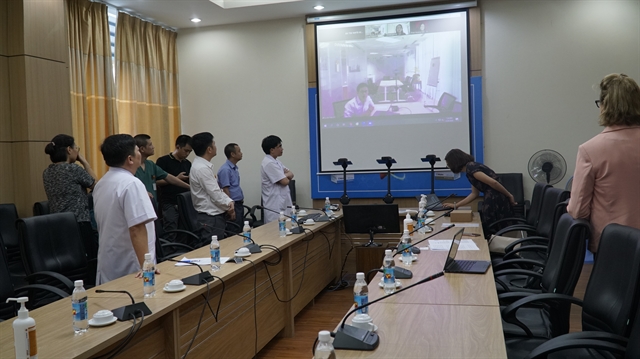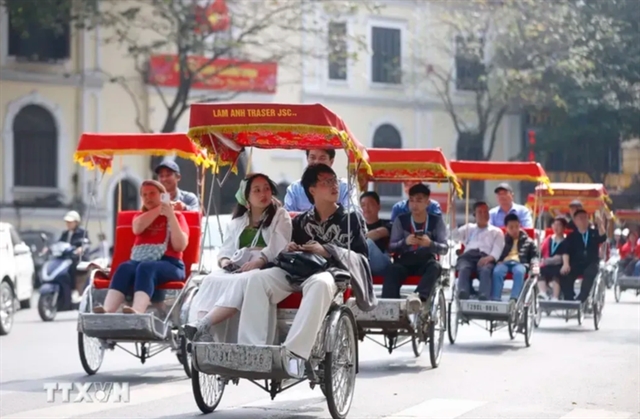 Society
Society

The United Nations Development Programme (UNDP) on Thursday donated three Ohmni Robots to the National Hospital for Tropical Diseases to help protect frontline doctors and nurses from COVID-19 and other infectious diseases.

|
| Ohmni Robots are tested at the National Hospital for Tropical Diseases. — Photo courtesy of UNDP |
HÀ NỘI — The United Nations Development Programme (UNDP) on Thursday donated three Ohmni Robots to the National Hospital for Tropical Diseases to help protect frontline doctors and nurses from COVID-19 and other infectious diseases.
Ohmni Robots have the main function of remote communication, remote diagnoses and treatment.
The robots are made by Ohmni Labs, which is based in Silicon Valley but has a Vietnamese co-founder, Vũ Duy Thức, and an operation team in Việt Nam.
More than 1,000 Ohmni Robots have been used in the US, India and Japan, mostly for hospitals and nursing homes.
Based on the test at the National Hospital for Tropical Diseases, the start-up can accelerate its process of setting up national production in Việt Nam.
Handing over the robots to the hospital, UNDP Resident Representative in Việt Nam Caitlin Wiesen said that those robots provided a safe interface between the doctor and the patient for diagnoses and they enabled doctors to see far more patients at a time.
“They are fully automatic and can be managed from a large distance and provided the added function of tele-medicine and tele-training, that will be very important for the interface between the National Hospital and hospitals in rural areas,” she said, adding that the intention was not to replace existing doctors and nurses, it was to complement and to provide safety in a highly infectious context.
Dr Nguyễn Vũ Trung, Deputy Director General of the Hospital, thanked UNDP for donating these robots, saying: “This is the first time we have seen robots of this kind.”
He said he believed the robots would help them a lot and the non-contact procedures will protect staff.
As a tropical country, Việt Nam is prone to many different infectious diseases like H1N1, H5N1 and SARS and yearly incurring diseases such as Hepatitis A and B, and dengue fever.
The National Hospital for Tropical Diseases is the frontline hospital to receive patients who get these highly contagious diseases.
According to Deputy Director General Trung, so far, the hospital only has PPE and tries its best to protect doctors and nurses, however there are still people who are at high risk because of their direct contact with patients, especially when they do procedures for care and treatment.
Dr Trần Văn Bắc, deputy head of the Hospital’s Emergency Department, said that during the COVID-19 pandemic and other infectious diseases, they had also used remote interaction tools, such as cameras in the patients’ rooms and apps to interact with patients.
“However, the quality of images and the flexibility of the interaction are limited. So, we ended up with direct contacts with the patients,” he said.
“We hope that these robots will help us reduce direct contact. The audio-visual quality and the ability to remote control them can help us diagnose and detect symptoms from afar. Moreover, this robot can be used in providing tele-medicine and tele-training for people and health workers in remote areas. With our role as the leading hospital for tropical diseases, we hope to utilise various applications of this new robot,” Bắc said after testing the robot.
This is the first in a series of robots to be delivered from UNDP to hospitals for testing and other applications, such as diagnosis, tele-training, autonomous delivery of supplies for COVID-19 and other infectious diseases.
The second robot, BeetleBot will be delivered in July.
After the test of these two types of robots, UNDP will organise dialogues among different robot makers, as well as among the hospitals, healthcare system stakeholders and robot makers, thus building a healthy robotic ecosystem in Việt Nam.
70 days without community transmission
No new coronavirus cases were confirmed on Thursday, marking 70 straight days without community transmission in Việt Nam, according to the National Steering Committee for COVID-19 Prevention and Control.
The national tally remains at 352, including 212 imported cases that were quarantined upon arrival.
A total of 9,437 people who had close contact with patients or were in pandemic-hit areas are now under medical monitoring or quarantine.
Up to 329 patients, or 93.5 per cent of the total, have recovered so far.
The remaining patients are in a stable condition, with one testing negative for the coronavirus once and three negative at least twice.
As the COVID-19 pandemic has been brought under control, the Government tasked authorities to increase the frequency of flights to bring home citizens stranded abroad.
A total of 29 repatriation flights have been arranged since April 24, bringing home 7,672 Vietnamese citizens from other countries or territories.
The Government has also decided to open borders to foreign experts, skilled labourers and investors as part of measures to reboot the economy.
At a meeting on Wednesday, Prime Minister Nguyễn Xuân Phúc said Việt Nam would not open its borders for international tourists anytime soon to avoid a resurgence of the disease.
He stressed the importance of staying on “high alert” to the pandemic.
With stringent border closures enacted since late March, Việt Nam has virtually eradicated the coronavirus outbreak within its borders. — VNS




